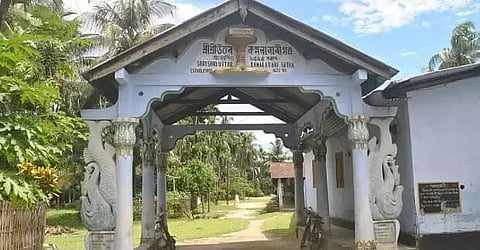
- Home
- Live Blog
- Breaking News
- Top Headlines
- Cities
- NE News
- Sentinel Media
- Sports
- Education
- Jobs

An SOS call by a Xatradhikar from Majuli on Friday urging the government to step in to ar rest the 'onslaught' of Christian missionaries has flagged a very serious issue. According to him, while Majuli is considered a sacred heritage island blessed with the presence of 34 Xatra monasteries, the number of Christian churches had nearly become double that of Vaishnavite Xatras. It is a fact that Christianity has made strong inroads into Majuli. But then, there is no provision whatsoever in the Constitution and laws of the land which can prevent churches and mosques from coming up in any place of India, including Majuli. Notwithstanding that reality, the Xatradhikar has cited The Majuli Cultural Landscape Region Act, which was passed in 2006 for the preservation of cultural values, ethos and identity of the cultural landscape of the heritage island which is also the heart of Assamese art, culture, literature, music and faith. It is true, and it is also unfortunate that the successive governments had simply failed in their bounden duty to implement this Act in the past 15 years. The BJP-led government, which first came to power in 2016 with the promise of protecting the "jati-mati-bheti" of Assam's indigenous people, had also miserably failed to implement even one clause of this Act; this is even though the previous chief minister represented Majuli in the State Assembly. But then it is not right on the part of the Xatradhikar to put the entire blame of the growing clout of Christianity in Majuli on the state government. Srimanta Xankaradeva had founded a faith – Eksaran Naama dharma – whose basic tenets included the establishment of a greater all-inclusive society free from the clutches of the typical caste divide. The great reformer and religious guru of Assam had, through the neo-Vaishnavite faith, envisaged a society where tribals and non-tribals, rich and poor, ruler and the ruled would all have equal say. It was through the Xatra and Naamghar institutions that Srimanta Xankaradeva had dreamt of such an inclusive and open Assamese society. But then, while the Xatra institutions have, over the centuries, largely failed to realize this dream of the Mahapurush, they have to also shoulder the blame of failing to attract the different ethnic communities into the precincts of the Xatra, particularly in Majuli. There have been a few exceptions though, like the late Pitambar Dev Goswami of Garamur Xatra – a great freedom fighter and social activist – who had reached out to several such ethnic communities. But the majority of the Xatra functionaries did not try to carry out, in reality, the mission set forth by the Mahapurush and the trend which the former Garamur Xatradhikar had tried to set. The assumption of office of the new Xatradhikar of the Barangajuli Xatra in Udalguri – a person from the Bodo community – for instance, did not appear to have been appreciated by the majority of Xatradhikars the way it should have been. Moreover, it is a fact that the Xatras have failed to keep pace with changing times affecting the greater Assamese society. The Xatra institutions have failed to realize the importance of responding to the changing needs of society, be it in the field of education, literacy, women empowerment, literature or culture. There is hardly one example of a Xatra ever setting up an institution of higher education of any discipline, including research in Xatriya art and culture. Srimanta Xankaradeva's teachings and concepts had covered a wide range of issues from religion to bhakti, individual life, family, society, karma, knowledge, human nature and behaviour, personality, animal welfare, health, environment, livelihood, etc. But no such example is readily available of any Xatra working or specializing in any of these areas keeping in view the pluralistic characteristic nature of the Assamese society. As for Christian missionaries, it is a fact that there have been serious allegations that conversions are being carried out particularly among members of the socially and economically disadvantaged groups of the state often through allegedly unethical methods. Freedom of religion in India is a fundamental right guaranteed by Article 25-28 of the Constitution, and every Indian citizen has a right to practice and promote his or her religion peacefully. But that does not mean individuals will be lured to accept another religion, and that too at the expense of indigenous faith, tradition and culture. Yes, Himanta Biswa Sarma's government has a great responsibility to protect indigenous faiths, especially in the backdrop of an aggressive conversion campaign mounted by a section of Christian missionaries. The responsibility has increased further in that the new government has created a department to exclusively look after the preservation of indigenous faiths that were "fading away" due to "preaching and professional management systems" of some so-called mainstream religions.